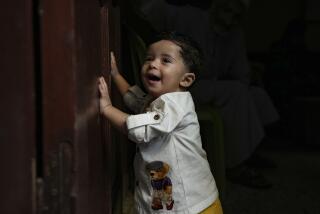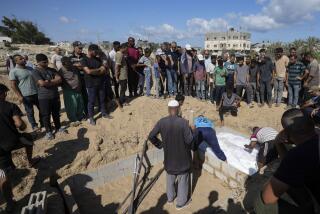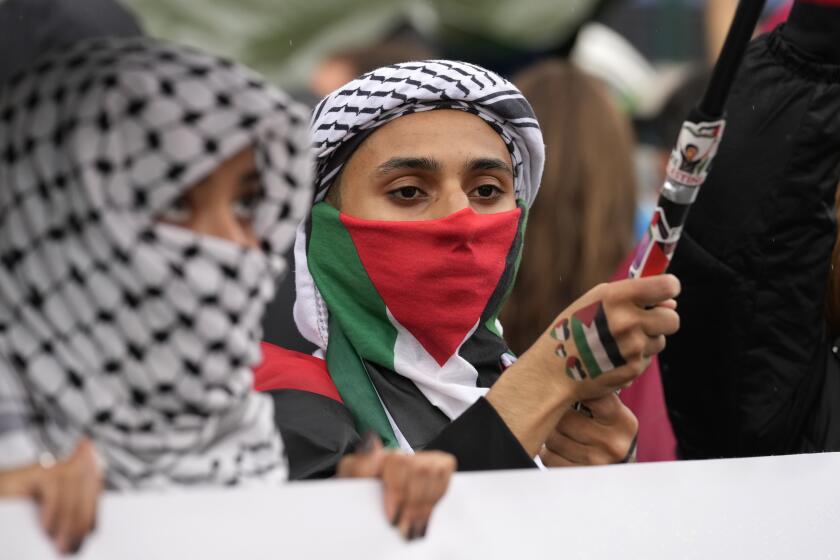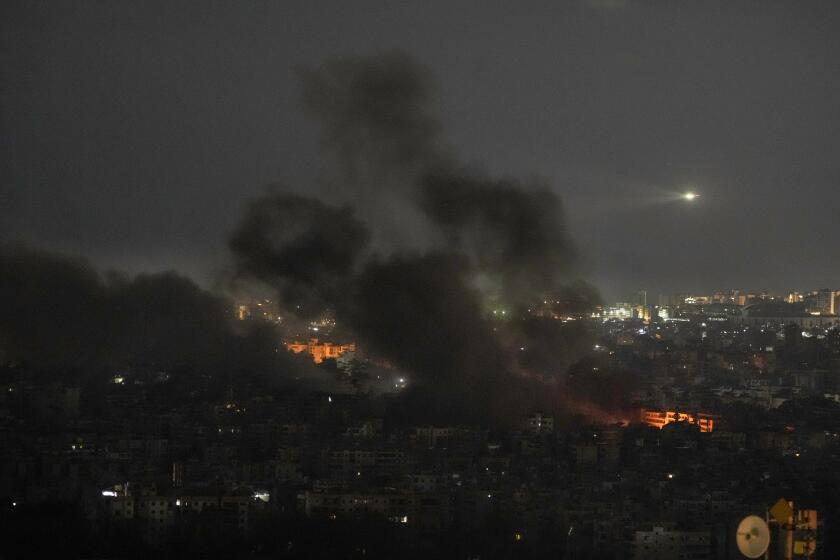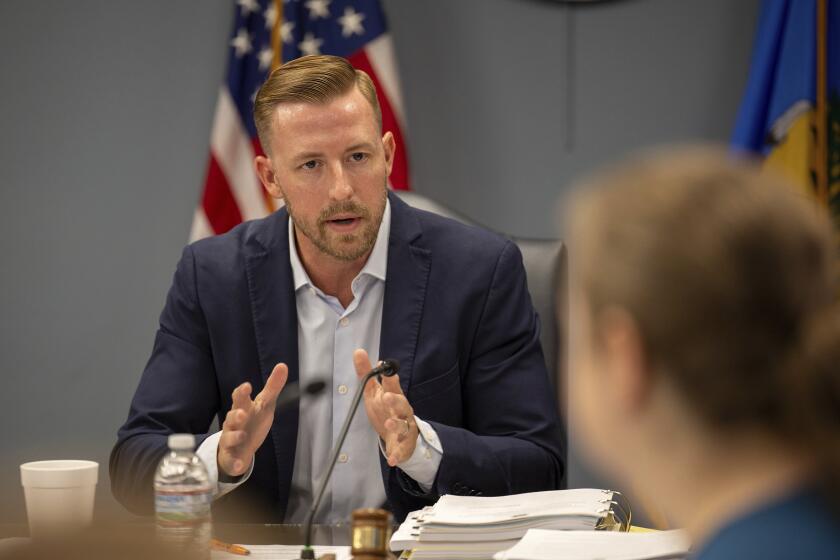
- “I would give anything — money, property, job — to have my family safe and alive. I lost my very dearest ones.” — Wael Ayesh of Gaza City, whose wife and three of his sons were killed in a bombing. Their bodies lay under rubble for 35 days.
- “My cousin was murdered, and another relative is a hostage. Everything is a problem within a problem, like a snake swallowing itself.” — Oren Levy in Tel Aviv.
- “I used to live in a house, but now we live in a tent.... Just like our home, my life is now a heap of black ashes.” — Abdul al-Ziz Omran, 14, from Khan Yunis, Gaza.
For some, it was a loved one killed, perhaps more than one. Or a cherished home destroyed. A neighborhood, a livelihood: vanished, along with a sense that life could ever again be safe or secure. A landscape of loss, extending as far as the eye can see.
A year after the attacks of Oct. 7, some Israelis and Palestinians recently reflected on the state of their lives and that of their respective societies. Here, in their own voices, is a chronicle of a calamitous year.

IN THE BEGINNING
On that Saturday morning at sunrise, hundreds of assailants led by the Palestinian militant group Hamas stormed through the border barricade surrounding the Gaza Strip, attacking a string of small communities, an open-air music festival and several military bases. In southern Israel, about 1,200 people were killed and around 250 others taken hostage.
“My younger daughter texted me: ‘Dad has been murdered. Help.’”
— Reut Karp, 43, an Israeli mother of three from Kibbutz Reim, who was away for the weekend when the attack took place. Two of her children were with their father and his partner at the kibbutz.

“Everything happened so fast, but at the same time, every second felt like a year. Everything so fast and so slow at the same time.”
— Nehoray Levy, 25, who survived the attack on the Nova music festival near the Gaza frontier that killed more than 360 people.
“We didn’t know what would happen [after Oct. 7]. But we knew it would be very, very bad.”
— Saeed Ghanem, 25, a Palestinian citizen of Israel, originally from the country’s north but studying engineering at a technical school in Jerusalem.
WAR COMES TO GAZA
After driving out the attackers, Israel launched a bombing campaign that was to become one of the most sustained and ferocious aerial attacks in modern warfare, with the stated aims of destroying Hamas and freeing the hostages. Relentless air assaults leveled entire residential districts, leaving thousands buried under rubble. Within weeks, Israeli ground forces entered Gaza.
“A neighbor woman said to us that she had seen her dead daughter in her dreams. So one of my daughters asked me: ‘What about our dad? Why hasn’t he come to visit us when we sleep?’ ”
— Sanaa al-Astal, a mother of four whose greengrocer husband was killed in southern Gaza in the early days of the war.

“At the start, when there were so many rockets all the time, we would try to make it a game with the children. ‘Oh, there’s a siren! It’s time for ice cream!’”
— Naor Shalon, an ultra-Orthodox Jew living in the southern Israeli town of Nevitot, on Hamas’ cross-border rocket attacks.
“How I wish it was Oct. 6, 2023, again! Even with all the difficulties Gaza faced, life was like a red rose for us. It was a decent life.”
— Mahmoud Attia al-Dali, 61, a former shopkeeper in central Gaza whose cancer treatments stopped after the war began.
THE LONG SIEGE
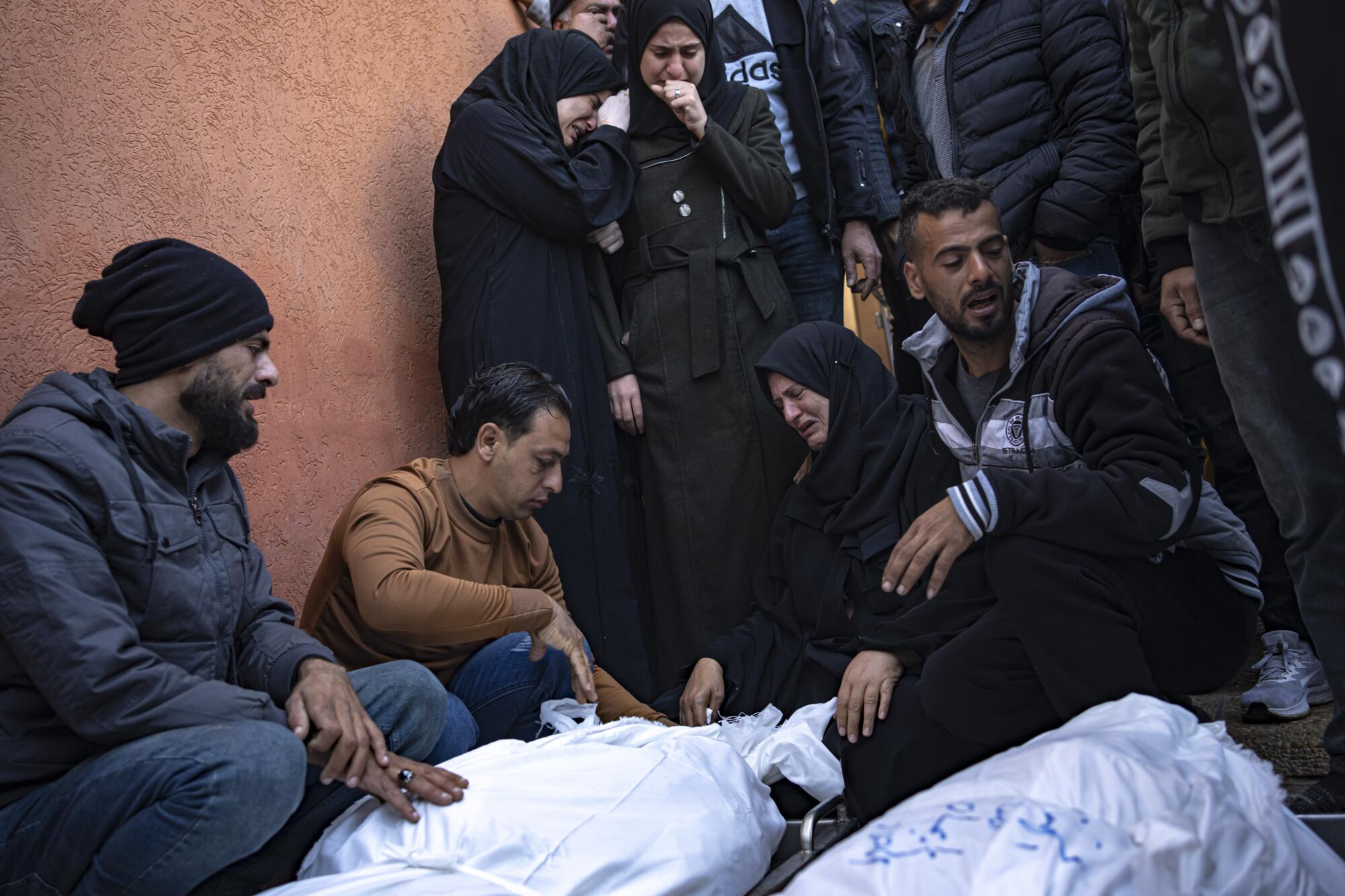
As the months passed with little letup in the bombardment, the Gaza death toll grew exponentially. It now stands at nearly 42,000, according to Gaza health authorities. World opprobrium rose against Israel. An exchange in the war’s second month freed more than 100 hostages, but Israeli families were frantic for those remaining. And violence surged in the Israeli-occupied West Bank, with hundreds of Palestinians killed by Israeli settlers and soldiers.

“The word ‘life’ has become just another word for death and sadness. One of my relatives, Abdullah, was killed when he went out to buy bread. We had played cards just the night before! Now whenever we play cards we think of him, how nice a guy he was.”
— Mohammed al-Farra, 19, a Gaza student from the southern city of Rafah.
“I’ve seen many wars, but not like this. You see the street? No people. The young men get arrested. No one can move about. The situation is very bad.”
— Fatima al-Masri, a Palestinian woman in her 80s whose husband owns a children’s clothing store in Jerusalem’s Old City.
“My cousin was murdered, and another relative is a hostage. Everything is a problem within a problem, like a snake swallowing itself, with no head and no tail.”
— Oren Levy, 62, a juice-bar proprietor in Tel Aviv’s Hatikva market, originally from Israel’s southern Negev desert.

“I’m from [the West Bank town of] Hebron, but I am married and live in Jerusalem, and since the war, it is impossible for me to travel to see my parents. Here is my littlest one; they do not know him.”
— Sundos al-Janaidi, 33, with 7-month-old Laith.
DISPLACEMENT
Under near-constant bombardment, with the Israeli military ordering evacuations from one area after another, nearly the entire population of Gaza was on the move. By the United Nations’ count, more than 1.9 people — 90% of the population — have been displaced, many multiple times as designated safe zones then became targets. In Israel, more than 75,000 people fled homes on Gaza’s periphery.

“I am the breadwinner, the cook, the one who brings buckets of water for washing and cooking, the one who carries our belongings from one place to another, time after time. I wish I could somehow find our old life.”
— Anwar Atef Badwan, 32, displaced 11 times, now living in a tent camp with her two young children in central Gaza.
“Some of our community [Kibbutz Reim] returned home, and some of us have stayed in Tel Aviv, in two adjoining buildings, like a small kibbutz. It’s too soon for my children to go back. My son, who is 9 ½ now, isn’t ready yet to visit his father’s grave.”
— Reut Karp, who opened a Tel Aviv cafe staffed with workers displaced from the Gaza periphery.

“We are afraid of more displacement. I used to live in a house, but now we live in a tent. I used to go to school, but now I just try to help my dad with his work fixing mobile phones. Just like our home, my life is now a heap of black ashes.”
— Abdul al-Ziz Omran, 14, from Khan Yunis, Gaza.

“When the Israeli forces attacked Rafah in early May, we had to toward the north. Then from the north to the south. North, south, north. My father, who used to be the calmest man, is so stressed and sorrowful. It’s like we live in a bad dream.”
— Mohammed Al-Farra, Gaza student.
NO WAY FORWARD?
On both sides, people speak of feeling trapped in a nightmarish moment that will not end. Palestinians in Gaza and the families of Israeli hostages who may still be alive in Gaza share a common fear: that their plight will be forgotten.
“Sometimes, sitting on my own, I’m afraid of losing my mind. I wonder what made us reach and witness this point of human misery. Our family is scattered everywhere. Little kids hauling gallons of water! All I could do was this: I made my 7-year-old grandson a little wooden platform with wheels to help him in this task.”
— Mahmoud al-Dali, the cancer survivor in central Gaza.

“If something terrible is in the past — a car accident, a sexual assault, a bus bombing — we can say to patients: ‘OK, this thing is over, and we are in the future now.’ But we can’t do that. Maybe Oct. 7 is behind us, but still the war is going on, and our hostages have not come home to us.”
— Reut Plonsker, an Israeli clinical psychologist who treats survivors of the Nova music festival attack.

“My life before was full of happiness. I would give anything — money, property, job — to have my family safe and alive. I lost my very dearest ones, and nothing can ever bring them back again.”
— Wael Ayesh, 50, who before the war ran a Gaza City beach cafe. His wife and three of his sons, aged 2 to 14, were killed in a bombing in January, after which, their bodies lay under rubble for 35 days

HOW MIGHT IT END?
Diplomatic hopes for a cease-fire in Gaza have been repeatedly dashed. And now a new crisis looms: Israel’s rekindled war with the Iranian-backed Lebanese militant group Hezbollah, which threatens to set the entire region ablaze. Many fear that the immense suffering of this past year could prove only a precursor.
“All of society is built on mutual care and responsibility. As a Jewish person, I’m supposed to care about other people, other people who are not Jewish. I’m here because I’m a Jew.”
— Dalit Shemesh, 61, attending a Tel Aviv protest to call for a cease-fire and hostage deal.
“We ask God all the time for a peace accord. It’s like a family quarrel.”
— A Palestinian woman calling herself only Umm Soud, 56, from the West Bank town of Bethlehem, selling grapes at the entrance to Jerusalem’s Old City.
“I only pray now for survival. Everything changed in me, and everything and everyone around me has changed.”
— Anwar Atef Badwan, displaced Gaza mother.
“For a long time I felt guilty because I survived, when I lost 10 of my friends, when other friends lost their boyfriend or girlfriend in front of their eyes. I thought, ‘Why me, why did I live?’ My answer is to try to be the voice, that’s the mission.”
— Nehoray Levy, music festival survivor who now advocates for mental health care for those affected by the attacks.

“God left my daughter Maria to me. And he gifted her with a new little girl, Abeer — they gave her the name of my dead wife. At least I can embrace someone from my family. That is what I have now.”
— Wael Ayesh, bereaved husband and father.
“We must thrive again; the only other option is to stay in bed and cry. Inside me, I have a room of my sadness, but it can’t be my daily life.”
— Reut Karp, the cafe proprietor from Kibbutz Reim.
“People don’t learn from history; they make the same mistakes over and over and over again. People want to own the land without sharing it with others. If the war ends, it will be temporary. It will start all over again.”
— Father Samuel Aghoyan, 86, an Armenian superior at the Church of the Holy Sepulchre in Jerusalem.

Staff writer King reported from Jerusalem. Special correspondent Shbair reported from Khan Yunis, Gaza.
More coverage of the yearlong Israel-Hamas war:
- Inside the Israeli lab ‘reassembling and reconnecting’ the mangled bodies of the dead
- ‘I need to ask God why.’ In Israel and Gaza, the scale of death overwhelms the living
- Two strangers — a Palestinian and an Israeli — tell the story of a region’s pain
- A stone, a bullet, a burial. A Palestinian boy’s death in the West Bank signals wider unrest
- ‘I was crying, screaming, praying, terrified’: A Gaza resident reports on life under siege
- In Gaza, she sits by her belongings, waiting for her home to be bombed
- Israel’s religious right has a clear plan for Gaza: ‘We are occupying, deporting and settling’
- This 5-year-old from Gaza is learning to live with one leg and untold loss
More to Read
Sign up for Essential California
The most important California stories and recommendations in your inbox every morning.
You may occasionally receive promotional content from the Los Angeles Times.

